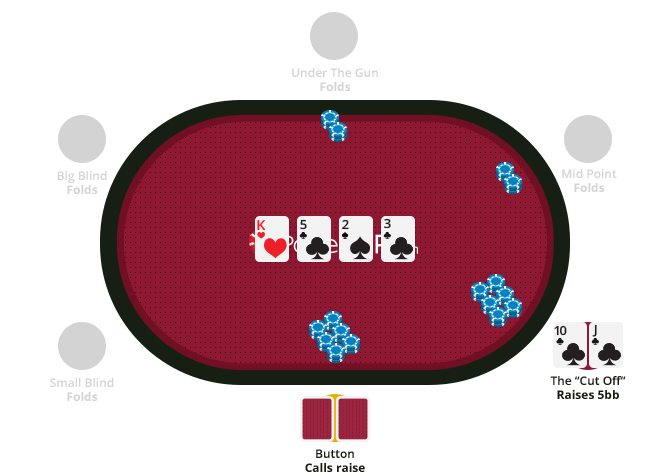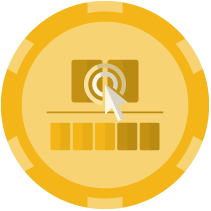There are different ways that people may be trying to cheat you at the poker tables. Learning how cheating is done will help you recognize and protect against these practices that can seriously hurt your bankroll.
The following is essentially

a guide on the different ways to cheat at online poker. Cheating is in no way advised and will likely end up with you getting your bankroll frozen. However understanding how to cheat is useful for protecting ourselves against suspicious activity. Sometimes if we are not aware of the different methods of cheating we will be blind to the fact that it is happening against us.
Collaboration
This is not always easy to spot although there can be some tell-tale signs. Collaboration (or
collusion) is essentially the practice of sitting down at the same table as one of your friends and working together to beat the table. Usually collaborators will be involved in a Skype or telephone call at the same time and share their hole-cards. This in itself will give a small advantage in terms of a blocker effect.
In many cases they may end up involved in hands together, but usually only when there is a third player involved. It's unlikely they will play big pots against each other heads up. They both know exactly what each other is holding and don't want to donate a decent chunk of money to the rake.
One trick collaborators might use is to involve you in a continual min-raise trap in an attempt to generate action. It might go something like this -
- Hero opens in the CO, BTN collaborator min-3bets, BB collaborator min-4bets, hero calls-min-4bet,
- BTN collaborator min-5bets, BB collaborator min-6bets, hero calls, BTN collaborator min-7bets.......
Hopefully you get the picture. It might not always be this obvious, good collaborators will take precautions to make everything look legit, but the truth is, people get greedy. You only need to look at the Absolute Poker "Potripper" scandal to see this. The guy wasn't even trying to make it look like he was playing poker, his style was so obviously not right, yet he was consistently winning.
There's a fine line between having people colluding against us at the tables and being paranoid - we shouldn't always assume players are ganging up on us!
Another thing they might do is take extremely strong lines against each other while playing against us to help them represent more strength. For example we bet the turn, collaborator-1 raises, collaborator-2 3bets. Collaborator-2 looks extremely strong here – normally he'd be pretty concerned that collaborator-1 has something here. Of course, he knows exactly what collaborator-1 has and this is all simply a ploy to get hero to fold.
Even if it's not that obvious we may occasionally get the idea that we are playing against a team of players rather than an individual opponent. There is a fine line between this and paranoia, so we shouldn't always assume players are ganging up on us. If we sense two players have formed a coalition we can also check to see which countries they are from. If they are from the same country then extra caution is advised. It's probably a good idea to leave the table just in case. Once again, if they are actually decent collaborators, it seems logical that they would at least pretend to be from a different country, perhaps using a VPN or something similar.
Bots
There are a decent amount of bots out there, especially at the lower limits. While these bots are quite beatable, in most cases we'd prefer to have a big fish at our table rather than a bot. Our
winrate will often be higher in this scenario.
For those that think bots are a pushover, times have moved on. There are currently bots crushing 50nl 6max, and every now and again we hear reports of a bot-ring taking millions off the mid-stakes games.
We won't discuss bots in detail here, check out the article “
Playing Poker vs Bots” for more information on how to recognize bots and protect yourself against them.
Disconnection Tricks
Some poker clients

offer disconnection protection at the table. This comes in two formats usually. The first is simply protection in the form of added time, perhaps an extra 2 minutes to reconnect if our connection drops. The other type of protection is in the form of a free showdown. If we disconnect on the flop with top-set and we don't manage to reconnect within the time allowed, the poker software will automatically deal the turn and river cards and split up the pot at showdown based on who has won. No betting takes place on these later streets so this is naturally a disadvantage to our opponent if he has a strong hand.
So let's say we are on the flop with a weak top pair and our opponent raises. We know he's the type that loves to barrel turn and river, sometimes for value and sometimes as a bluff. However most of the time he will be firing and our decision is going to be very difficult with our weak top pair. If we were simply facing the flop raise only, it wouldn't be that tough. We get an ok price and we can fully realise our
equity. It's actually a pretty easy decision if we are not threatened by turn and river bets. So we can simply pull the plug on our router and take our cheap showdown.
Thankfully most poker clients with this feature only offer a set amount of disconnect protection. Perhaps they offer 2 disconnection protects per session or something similar. If we see our opponents disconnecting at what appears to be very specific times with specific holdings then it's worth just giving them a note and potentially avoiding them. I have run into a few guys like this – most of them pretty bad players anyway, but it's still frustrating when our opponent keeps taking free
showdowns on us.
Hole-Card Cheaters
If you fall victim to this trap you are going to find yourself getting absolutely destroyed at the tables in a horrible way. A hole-card cheater is someone who is playing against you while seeing your hole-cards. There are 3-ways this can happen, let's briefly review them.
Sharing Screen with Enemy – While sweat sessions are a recommended way to improve our poker skills, we need to always make sure we trust the person who is sweating us. Ostensibly they are here to help, but they may also be on all of our tables exploiting the hole-card info they see. This can happen at any stakes – google search “Girah poker scandal” for an interesting read about this happening in the high stakes world.
Scammers will often set up multiple accounts (another illegal activity), to help them convince you that you are playing against an unknown.
Naturally if they used the same account for hole-card cheating every time, that account would have an insane winrate and they could end up being investigated by the network they are playing on. So in order to keep a low profile multi-accounting among hole-card cheaters is common.
Sweat sessions are great way to improve your poker skills, but you should be careful to fully trust a person you are doing it with that they will not use the info against you.
Hackers – Most low limit grinders are not necessarily a big target for expert hackers. But it's still good to be cautious. It's not too difficult for even an inexperienced hacker to try and place a trojan horse on our computer allowing him to receive our hole-card information from our screen. We should always make sure we have up-to-date anti-virus software, a running firewall, and avoid downloading any suspicious files from players we don't know, especially .exe files. It goes without saying also that we should avoid suspicious looking emails if we don't know the sender.
Sometimes a trojan can come in the form of software that is designed to help at the tables. I have even seen software that claims it can tell you what the turn and river cards will be using it's “algorithm detection software”. This is obviously completely ridiculous, but such programs can sometimes end up being the medium for a trojan horse. What starts out as a novelty download of a program that you know won't work can be what ends up destroying your poker career.
Site Corruption – For real world examples of this kind of thing google search for “absolute poker cheating scandal” or “ultimate bet cheating scandal”. In these instances it wasn't the entire site which was corrupt, but unscrupulous individuals who knew how to access hole-card information. As we mentioned above, they did this without tact and it was blindingly obvious they were cheating. There are some interesting documentaries about this online.
In some cases the entire site ownership is corrupt. Several years back I signed up to an online poker site named “Pitbull Poker”. I received $5 free and spun it up to around $100 or so. I was running good, but at the same time couldn't help but feel that something suspicious was going on. A few days later a lengthy 2p2 thread appeared with decent players listing reasons why they felt that super-users were playing. They were clearly more tactful than the Absolute Poker superusers but it was obvious to anyone who looked closely. As you can imagine, I must have ran really well to spin $5 into $100 when playing vs superusers.
Don't just assume any site with online presence is legit: make sure to do some research before committing any money!
About a week later, we couldn't log into Pitbull Poker. The site had been closed down and the owner had been taken to jail. It wasn't even clear whether he was taken to jail over his poker site or something completely unrelated. Either way, I never saw that $100 again – no user was refunded. At least I only started with $5 so I didn't feel that bad. I feel worse for the people who decided to deposit a decent chunk of money, only to log on and find the site closed with all funds seized.
Anyway, the moral of the story is, don't just assume any site with an online presence is legit. Do some research before you sign up to certain sites. Find out about withdrawal times and any withdrawal problems. Don't necessarily believe everything you read however – scammers also like to post lengthy stories on how they were screwed over by a certain network. In reality the network was completely justified in seizing their funds since they were blatantly chip dumping, money laundering or cheating.
Scammers
This is a big problem that exists in the poker world but likely doesn't affect us directly on the table. As poker players we often make various deals with other players. For example we sign up through an affiliate for
rake-back, or we offer money to stake certain players.
I once signed up as a

sub-affliliate through an affiliate by the name of Royal Stakes. I referred 10 or more guys and for a while was watching the rake come in. I logged on one day to find that the percentage I was being offered had been altered with no warning. This meant my referrals were grinding thinking that they were making 60% RB when they were now only making 30%. When I emailed support about this I got no response and have never received a cent from them to this day. So essentially they stole from both me and my referrals.
Again, read reviews first and be careful investing your time with small companies. If you are interested in becoming a sub-affiliate then you are making the right choice using a company like pokervip.com where you are guaranteed to get a payout once your referrals generate rake.
The other type of scammers mentioned above were stakees.
Staking might seem like a good way to generate passive income but it's important to realise that it is extremely high risk, not just because of the variance but because there are a bunch of guys out there who simply want to run off with our stake money. In fact the first guy I ever staked was a guy from Romania who seemed very open and honest, but disappeared from Skype the second I shipped funds.
A friend of mind who owns a staking stable occasionally sends me graphs to look at, and I could tell straight away that one graph had been forged because the numbers didn't make sense. The guy had obviously gone through his database and deleted all losing hands until his winrate was significantly over 10bb/100. It was around 14bb/100 over a large sample, and his style was not a winning style. If his graph had been 1bb/100 maybe he'd have even got a stake. But 14b/100 over a big sample size from a fish was obviously an attempt to scam the staker.
There is a board of shame on 2p2 forums where known scammers are outed along with their real-life names, their online aliases and other useful information to help any new, potential victim.
Whether he legitimately intended to run off with staking money or actually play with it and send the profits, we don't know, he never received a stake. But even if he intended to play with the money he was still scamming. Stakers make decisions in the same way poker players do, on a risk/reward basis. And if a player is lying about his results it makes the risk seem lower than it actually is. It doesn't allow the backer to make a proper
EV decision so essentially it is theft of EV.
Even now I get guys sending me Skype messages for stakes who turn out to be blatant scammers. On the 2p2 forums there is a board of shame or a blacklist thread where known scammers are outed along with their real life names, various screen-names and other aliases. The first thing I do one someone approaches me for a stake is search their screen-names and aliases for any black marks. I will also ask if they have received any stakes in the past. Any dishonesty regarding any question they are asked should be treated as a huge warning sign.
I asked one guy if he was staked before and he told me he was staked for a certain limit by a certain staker. He had no clue that I knew the staker in person and had him on my Skype list. I shipped a quick message to the staker to confirm, who told me that the prospective horse was flat-out lying about the limits he was staked for previously. Epic fail.
Chip Dumping
Chip dumping (transferring chips to another player on the table) is against the rules of all poker sites. This is not a form of cheating that generally affects us directly. However it's worth noting that innocent players can sometimes get their accounts frozen. If someone at the table is chip dumping they may occasionally splash around money to other players in an attempt to cover their tracks. If we are the recipient of a few huge donations we can sometimes be implicated in the chip-dumping crime and find our account frozen.
Transfers
Be very careful when

someone asks you to trade money with them. They might ask for you to send them $500 dollars via skrill in return for $550 on Pokerstars. Seems like a good deal right? Not if that money on Pokerstars has been money-laundered. Your $550 will be confiscated and the person you transferred the Skrill funds to will be nowhere in sight.
Also keep in mind that some transfers are anonymous while others aren't. So we should be careful transferring anonymous currencies for tracked currencies. In other words if we send someone $500 worth of bitcoins, that transfer is permanent. If someone sends us $500 on paypal, that money is subject to a clearing period. The sender might find a way to retract the money by making a complaint, or maybe it will get seized if it is laundered money. Once bitcoins leave your account they are gone forever, it's an anonymous currency.
Caution
Simply knowing the different ways we can be cheated will help us to be vigilant when dealing with various situations. If someone tries to scam us it's good to make the information public. We can help others to avoid being scammed in the future. As poker players we are always on the alert for tricks and traps. This applies off the table also.
 a guide on the different ways to cheat at online poker. Cheating is in no way advised and will likely end up with you getting your bankroll frozen. However understanding how to cheat is useful for protecting ourselves against suspicious activity. Sometimes if we are not aware of the different methods of cheating we will be blind to the fact that it is happening against us.
a guide on the different ways to cheat at online poker. Cheating is in no way advised and will likely end up with you getting your bankroll frozen. However understanding how to cheat is useful for protecting ourselves against suspicious activity. Sometimes if we are not aware of the different methods of cheating we will be blind to the fact that it is happening against us. offer disconnection protection at the table. This comes in two formats usually. The first is simply protection in the form of added time, perhaps an extra 2 minutes to reconnect if our connection drops. The other type of protection is in the form of a free showdown. If we disconnect on the flop with top-set and we don't manage to reconnect within the time allowed, the poker software will automatically deal the turn and river cards and split up the pot at showdown based on who has won. No betting takes place on these later streets so this is naturally a disadvantage to our opponent if he has a strong hand.
offer disconnection protection at the table. This comes in two formats usually. The first is simply protection in the form of added time, perhaps an extra 2 minutes to reconnect if our connection drops. The other type of protection is in the form of a free showdown. If we disconnect on the flop with top-set and we don't manage to reconnect within the time allowed, the poker software will automatically deal the turn and river cards and split up the pot at showdown based on who has won. No betting takes place on these later streets so this is naturally a disadvantage to our opponent if he has a strong hand. sub-affliliate through an affiliate by the name of Royal Stakes. I referred 10 or more guys and for a while was watching the rake come in. I logged on one day to find that the percentage I was being offered had been altered with no warning. This meant my referrals were grinding thinking that they were making 60% RB when they were now only making 30%. When I emailed support about this I got no response and have never received a cent from them to this day. So essentially they stole from both me and my referrals.
sub-affliliate through an affiliate by the name of Royal Stakes. I referred 10 or more guys and for a while was watching the rake come in. I logged on one day to find that the percentage I was being offered had been altered with no warning. This meant my referrals were grinding thinking that they were making 60% RB when they were now only making 30%. When I emailed support about this I got no response and have never received a cent from them to this day. So essentially they stole from both me and my referrals.  someone asks you to trade money with them. They might ask for you to send them $500 dollars via skrill in return for $550 on Pokerstars. Seems like a good deal right? Not if that money on Pokerstars has been money-laundered. Your $550 will be confiscated and the person you transferred the Skrill funds to will be nowhere in sight.
someone asks you to trade money with them. They might ask for you to send them $500 dollars via skrill in return for $550 on Pokerstars. Seems like a good deal right? Not if that money on Pokerstars has been money-laundered. Your $550 will be confiscated and the person you transferred the Skrill funds to will be nowhere in sight.

